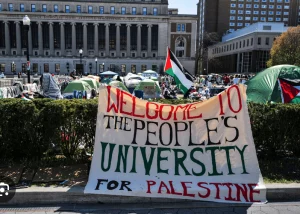Terrorism Supporters on US Campuses are NOT American Students
The vast majority of the terrorism supporters in the US campuses are not American students.
Why aren’t terror students punished for their despicable actions? And who benefits from all this?
“It’s not just tuition money that schools are milking. Foreign governments also write big checks to ensure that their students—and their politics—are given red-carpet treatment at big-name universities. According to the National Association of Scholars, since 2001 Qatar has given around $5 billion to American universities, more than any other foreign government. Between 2014 and 2019, American colleges and universities received $2.7 billion in Qatari funding without any public acknowledgment of the source of those funds. Given that Qatar hosts the leadership of Hamas, one can see how cracking down on Hamas-sympathizing students might seem like a bad idea for university presidents who cash Qatari checks.”
Accommodating overseas elites by tolerating antisemitism on U.S. campuses is part of a scheme to turn loss-leader DEI categories into profit centers.
 Five weeks after Rutgers University suspended the New Brunswick campus chapter of Students for Justice in Palestine (SJP) on Dec. 11 for violating several university policies, the school reversed its decision and reinstated the pro-Hamas group. In celebration, SJP members filmed a video in the classic Palestinian terrorist style: faces covered in kaffiyehs, reading a communique which, following a diatribe against the Zionists, made a list of demands that the school must meet if it wished to wipe the stain of its complicity in genocide.
Five weeks after Rutgers University suspended the New Brunswick campus chapter of Students for Justice in Palestine (SJP) on Dec. 11 for violating several university policies, the school reversed its decision and reinstated the pro-Hamas group. In celebration, SJP members filmed a video in the classic Palestinian terrorist style: faces covered in kaffiyehs, reading a communique which, following a diatribe against the Zionists, made a list of demands that the school must meet if it wished to wipe the stain of its complicity in genocide.
Since October, American cities and college campuses have been transformed into stages for this kind of Middle Eastern performance theater in support of Hamas and its murder, torture, and rape of Jews. Performances have ranged from vicarious partaking in the Oct. 7 pogrom, like the tearing down of posters of kidnapped Israelis, to calls for “globalizing” Palestinian terrorism “from New York to Gaza,” to outright expressions of support for Hamas and the extermination of Jews “from the river to the sea”—“by any means necessary,” lest there be any confusion. “There is nothing, nothing more honorable than dying for a noble cause, for justice,” a high-profile organizer of a rally at Columbia shouted into a bullhorn in a thick Arabic accent.
There’s also no confusion about the fact that these rallies feature Arab and Muslim students who eagerly support terrorism—often by denying that Hamas or its actions of Oct. 7 constitute “terrorism” at all. Equally evident is that many of the students leading, organizing, and participating in these protests and expressions of antisemitism and support for Hamas on college campuses are not Americans—meaning that they are not American citizens or even green card holders. Rather, they are foreign passport holders, including from Arab and Muslim countries, who have decided to avail themselves of U.S. educational infrastructure while importing the passions and prejudices of their home countries to American campuses.
American universities have made either an exceedingly clever or else exceedingly reprehensible bargain: quota-filling at a profit.
Indeed, the universities have acknowledged the obvious fact that many of the campus protest leaders are foreign students, here on limited educational visas, in the manner with which they have chosen to handle the Gaza protests. Early on, the Massachusetts Institute of Technology (MIT) cautioned students who occupied lecture halls, prevented other students from going to class, and otherwise violated school policies and guidelines, that they could face suspension for their behavior. But it quickly became clear there would be no serious consequences for noncompliance. When the students pressed on, MIT only suspended a handful of them “from non-academic campus activities.” The explanation MIT President Sally Kornbluth gave for her decision was unambiguous: “serious concerns about collateral consequences for the students, such as visa issues.”
Plainly put, what Kornbluth said is that foreign students have been violating school policy, but academic suspension or expulsion would terminate their ability to remain in the country. MIT therefore refrained from disciplining these students in order to keep them enrolled.
Kornbluth’s concerns were well-founded. There are laws on the books that apply to foreign students and other nonresident aliens in the United States who support terrorist organizations like Hamas. Since October, leading Republican lawmakers have reminded everyone of the existence of these laws. Reps. Jim Banks, R-Ind., and Jeff Duncan, R-S.C., led 17 other Republican House representatives in a letter to Secretary of Homeland Security Alejandro Mayorkas and Secretary of State Antony Blinken “to request information regarding the potentially unlawful presence on U.S. soil of non-immigrant foreign nationals who have endorsed terrorist activity.” The letter explained the relevant law:
Student visa applicants, like all non-immigrant visa applicants, must qualify under the Immigration and Nationality Act (INA) to be approved for a visa. They are subject to a wide range of ineligibilities in Section 212(a) of the INA.
By: Tony Badran, Tablet Magazine

Your financial support helps the Committee to ‘get out the vote’ and communicate its message, its event sponsorships, and news worthy content to Brewster constituencies. Your financial contribution – regardless of the amount – is appreciated and will be used efficiently.
